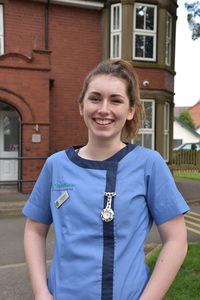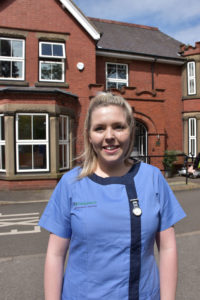Veterinary Nursing Awareness Month 2018 (VNAM)
Each May we celebrate Veterinary Nursing Awareness Month (VNAM). This was originally started by The British Veterinary Nursing Association (BVNA) in 2005 in order to raise awareness of how important veterinary nurses are to the veterinary profession. It has become increasingly popular over the years and has now spread to one whole month of appreciation and promotion of the veterinary nursing industry.
Each year our nurses at Hollybank get involved and this will be our fourth year of educating the public about a nurse’s daily roles and responsibilities. We try to include useful, interesting and informative information with, of course, some cute and cuddly pictures thrown in! We feel it is really important to do this as your pets spend lots of time with our nurses and their hard work, time, commitment and love can often go missed behind the scenes.
We have six registered veterinary nurses (RVN’s) at Hollybank, Cat, Leonie, Aimee, Alicia, Jess and Natalie. We also have two Student Veterinary Nurses’s (SVN’s) carrying out their placement with us. First off are in fact our SVN’s detailing how to become a veterinary nurse.
How to become a Registered Veterinary Nurse (RVN)
Veterinary nursing is a profession where attention to detail matters. Whichever route you take, there is hands-on training and requires a lot of dedication and different skills. However, veterinary nursing is rewarding and can open a lots of career avenues in the animal sector!
To become a Registered Veterinary Nurse (RVN) with the Royal College of Veterinary Surgeons (RCVS), work experience prior to getting on any course is essential and the amount of experience needed varies between institutions. Experience could include being in practice, wildlife sanctuaries, kennels/catteries, animals shelters, farms or zoos. Time spent at these places is invaluable and will really boost your personal statement. Qualifications needed to get onto a veterinary nursing course includes, but is not limited to, A-levels (Biology) and BTEC Level 3 Extended Diplomas (science or animal related).
Full-time university courses such as the Bachelor (BSc) (honours) or Foundation (FdSc) degrees at Harper Adams University offer two-three years of theory and one year of a practice work placement at an RCVS approved training practice. Some institutions offer both degree courses and diplomas. Level 3 diplomas or apprenticeships (BTEC, City of Guilds or NVQ) are known as vocational courses where you will be employed within a veterinary practice and attend college one day (or more) a week to learn the theory behind veterinary nursing. The length of all courses varies, have a look around and see what best suits you!
For more information on veterinary nursing apprenticeships please visit the UK Government website: https://www.gov.uk/guidance/agriculture-environmental-and-animal-care-apprenticeships.
For more information on university veterinary nursing courses please visit The University and Colleges Admissions Service (UCAS) website: https://www.ucas.com/ or the list of RCVS Accredited Further Education Qualifications in Veterinary Nursing: https://www.rcvs.org.uk/document-library/list-of-rcvs-accredited-further-education-qualifications-in/.
All veterinary nursing courses have a range of assessments including examinations, reports, Objective Structured Clinical Examinations (OSCEs), and completion of your Nursing Progress Log (NPL). Some task areas of the NPL include: handling and restraint, radiography, communication, laboratory techniques and theatre practice which can be practiced on a wide range of species (from dogs and cats to exotics). These tasks will be complete once you feel confident in those areas and your practice clinical coach approves this. Once qualified as a RVN, a minimum of 15 hours of Continuing Professional Development (CPD) should be completed to keep your knowledge up to date. This can be done by attending organised CPD events.
Most veterinary nursing courses focus on small companion animals, but there is the option to do other courses too such as equine nursing. You can also further your knowledge in areas of your interest such as nutrition, pharmaceuticals, behaviour, rehabilitation, exotics and complementary therapies by doing additional qualifications. There is also the possibility of working in different clinical environments such as a first opinion practice or referral hospital once qualified.
Hollybank’s Student Veterinary Nurses (SVN)
Katie
 I am studying a foundation veterinary nursing degree at Harper Adams University and I was able to get onto this course by completing an access year post A-levels. This totals 4 years including my placement year in practice. I have always wanted to be a veterinary nurse from a young age and from work experience completed in the school holidays. I wanted to experience university life away from home and do the theory groundwork before going into practice. It takes commitment, perseverance and time to achieve the final goal. Once qualified, I would like to do an accompanying qualification in nutrition and equine nursing.
I am studying a foundation veterinary nursing degree at Harper Adams University and I was able to get onto this course by completing an access year post A-levels. This totals 4 years including my placement year in practice. I have always wanted to be a veterinary nurse from a young age and from work experience completed in the school holidays. I wanted to experience university life away from home and do the theory groundwork before going into practice. It takes commitment, perseverance and time to achieve the final goal. Once qualified, I would like to do an accompanying qualification in nutrition and equine nursing.
Leah
I am studying BSc  veterinary nursing and practice management at Harper Adams University and I am on my third year work placement at Hollybank. After completing my A-levels at sixth form, I believe I chose the university route over the vocational route as I am more academically minded. I have been able to gain the theory based knowledge before heading into practice and I feel this gave me a foundation of understanding to work from and apply. It also gives you the chance to split the theory work from the practical work. It is good that there are other routes into veterinary nursing to cater for everyone but I personally wanted to be away from home and seek independence.
veterinary nursing and practice management at Harper Adams University and I am on my third year work placement at Hollybank. After completing my A-levels at sixth form, I believe I chose the university route over the vocational route as I am more academically minded. I have been able to gain the theory based knowledge before heading into practice and I feel this gave me a foundation of understanding to work from and apply. It also gives you the chance to split the theory work from the practical work. It is good that there are other routes into veterinary nursing to cater for everyone but I personally wanted to be away from home and seek independence.
I chose to go to Harper Adams University because it is a rural university with lots of opportunity to work with livestock. I have always wanted to work with animals both big and small and I particularly strive to incorporate farm animal nursing into the agricultural-veterinary sector more. I have also thought about the possibilities of working or volunteering abroad with a wider range of species. What is great about veterinary nursing is that you are not restricted on the types of animals you can nurse!
